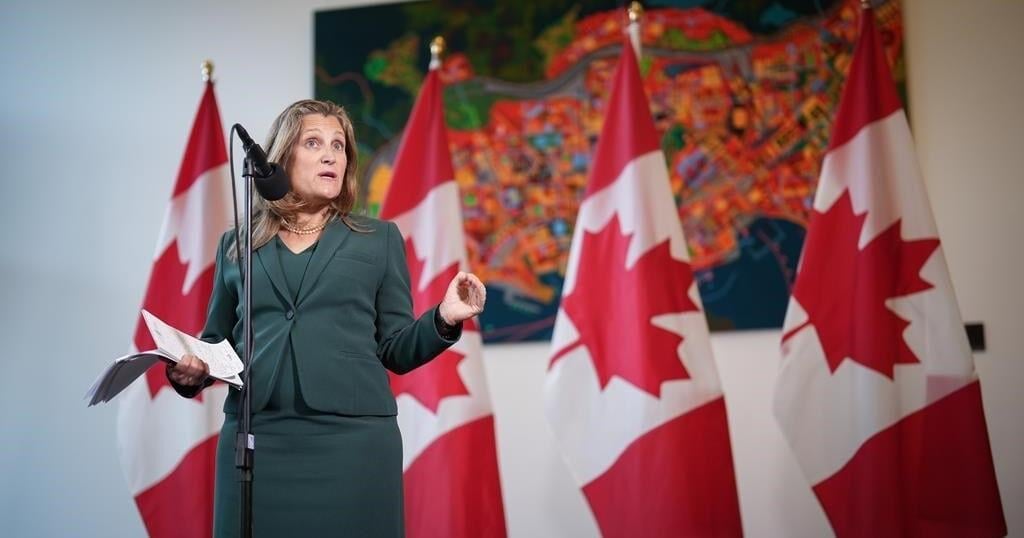Premier Doug Ford, bottom, joins a town hall, Monday afternoon, with OntarioÕs Northern chambers of commerce. Joining Ford at the town hall were North Bay & District Chamber of Commerce president and chief executive officer Peter Chirico, top right, Kenora-Rainy River MPP Greg Rickford, Parry Sound-Muskoka MPP Norman Miller, and Nipissing MPP Vic Fedeli. Screenshot
Northern Ontario chamber of commerce members heard directly from Premier Doug Ford Monday on how his government plans to help the region restart the economy after COVID-19.
And he took the first few minutes of his monologue to give a plug to Progressive Conservative MPP’s in Northern Ontario and urge participants to ensure more get elected next time around.
He called his PC MPPs “triple hatters” because the Sault’s Ross Romano, North Bay’s Vic Fedeli and Rainy River’s Greg Rickford and Parry Sound-Muskoka’s Norm Miller are representing more than just their own ridings.
“I don’t even know who the MPPs are for Sudbury or Thunder Bay becasue they aren’t even speaking up,” Ford said from his Toronto office. “We need loud voices for economic development and we need more people to stand up and be heard.”
Ford said that his government has helped Northern Ontario but “everything we have done for the north, other representatives have voted against it, especially the NDP members.”
Ford, along with Fedeli, Rickford and Miller (Romano sent his regrets due to another commitment) spoke to chamber of commerce members in a session themed ‘Leadership during the COVID-19 Crisis.’
Ford said he wants to continue to cut bureaucracy and red tape to strengthen the Northern Ontario economy.
He said while it’s government’s job to set the stage or create the proper environment for business but it’s the entrepreneurs and business owners who make businesses thrive and prosper, which in turn helps employees thrive, gives them security and puts food on their table.
Ford was asked if he will continue to make ‘regional’ based decisions on reopening if Northern Ontario COVID-19 numbers remain low.
Ford said he would, reminding zoom participants that Northern Ontario moved into Stage 2 and Stage 3 of reopening quicker than other parts of Ontario.
“Northern Ontario shouldn’t be punished because of Toronto, Ottawa and Peel,” he said.
Communities, businesses and Ontarians must continue to follow the policies and recommendations made by the health team, Ford said.
“There has been some recklessness and carelessness and socializing in massive groups,” he said. “That can’t happen.”
He didn’t specifically identify what sectors or industries would be forced to close first if a second wave of positive COVID-19 tests struck Ontario.
Ford was also asked to share his position on the resources and capacity of the digital economy in Northern Ontario.
He said he has has discussions with Prime Minister Justin Trudeau on the importance of expanding broadband service, especially in Northern Ontario.
“No infrastructure project is more important to people of Ontario than broadband,” he said.
Estimates suggest $10 to $15 billion would be needed to put broadband across the province but assistance is needed from the federal government, he said.
“Why should the people of the north be punished?” Ford asked. “We need the federal government support and I’ve been on them like a dog on a bone.”
Ford promised the business community that the provincial government will continue to find ways to pay down the province’s debt.
“That’s what we got elected to do,” he said. “We will pay down debt with the creation of more jobs, grow our economy and we will continue to do that.”
Ford gave kudos to all those working in the health care sector for keeping communities safe.
He also gave Northern Ontario the thumbs up – the region has less than five active COVID-19 cases – and urged people to continue to follow the advice of the medical officer of health.
“Those numbers just speak volumes for a geographical area as large as Northern Ontario,” he said.
The virtual town hall meeting was led by the North Bay Chamber of Commerce, in partnership with chamber’s from across Northern Ontario.

























